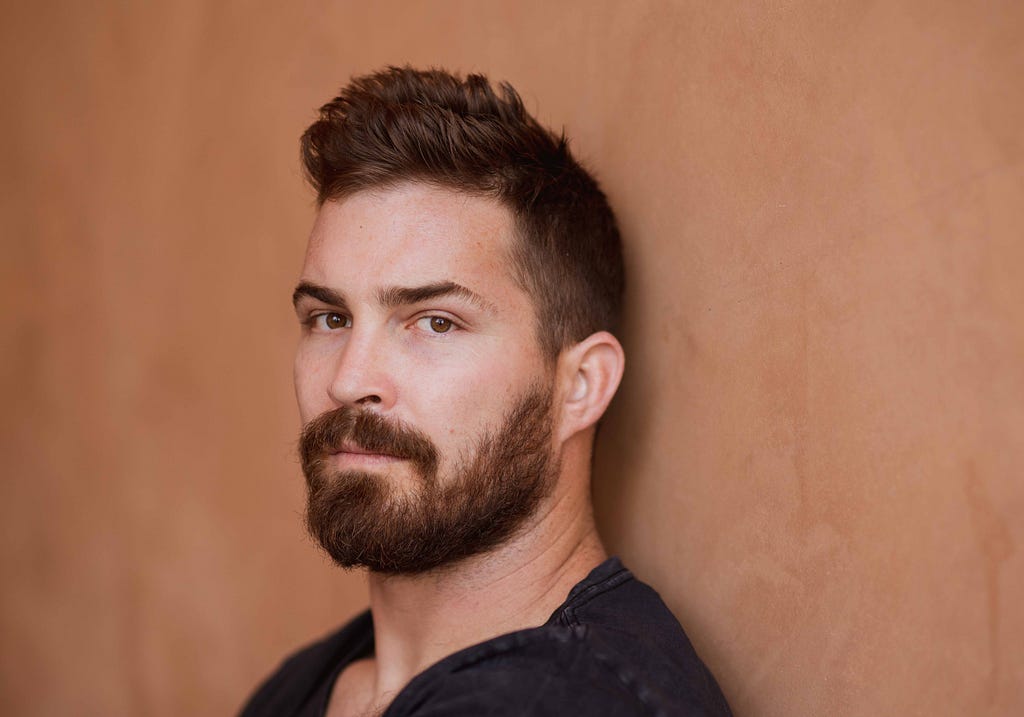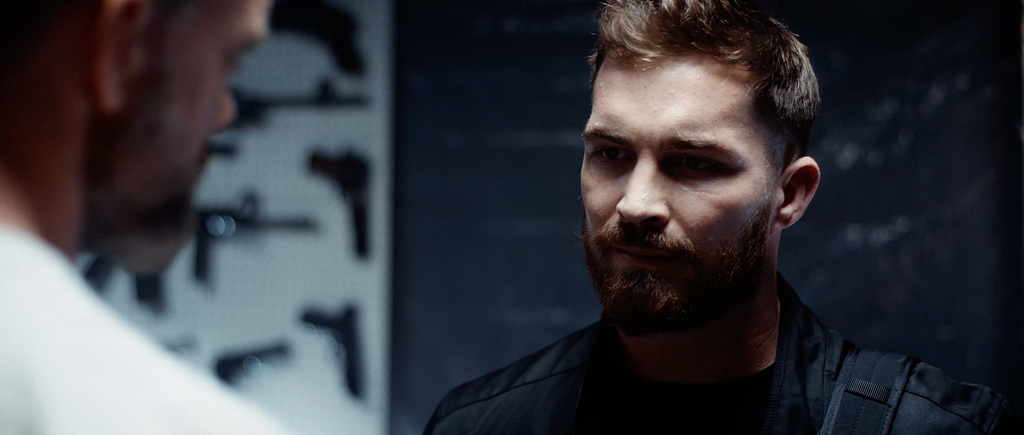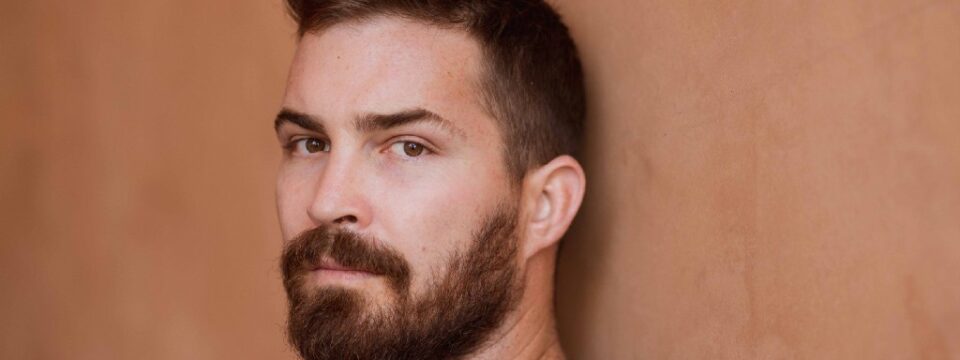Sean Crampton of Bloomfield Boys Productions: 5 Things I Wish Someone Told Me When I First Became A Filmmaker

Don’t hear a story about another artist’s success and try and replicate any of it. The “anomaly curse” I call it. Everyone’s story is unique! I once knew an actor I admired who got discovered with no head shot! Well, after that, guess who decided head shots weren’t worth the cost / effort / etc. Me! Guess who almost got kicked out of an agency meeting for not bringing the one thing they asked me to bring (a headshot). Me! His wasn’t my path. My path is my path.
As a part of our series called “5 Things I Wish Someone Told Me When I First Became A Filmmaker”, I had the distinct pleasure of interviewing Sean Crampton.
Sean Crampton is an award-winning actor and hands-on independent producer based out of Los Angeles. Sean most recently wrote and directed the pilot episode of HELMET (2023) for Bart Rome. During the pandemic he produced two feature films; THE WHEEL for Steve Pink, which had its world premiere at TIFF (2021); and GOOD BAD THINGS for Shane Stanger (2023). Before that Sean executive produced, wrote, and co-starred in THE STALKING FIELDS (2022). His first feature film, RICHARD PETER JOHNSON (2014) can be seen everywhere on demand. The film garnered national recognition when it made a clean sweep of festival awards at The Playhouse International Film Festival in 2015. On a $10,000 budget, no less. Sean aims to have better set conditions and hours for casts and crews. On his last film, GOOD BAD THINGS, he was able to have 2–4 day work weeks and 12 hour days max. A better standard for his artists. He believes that, “we spend more time making the picture than celebrating it, so we should make sure the on-set experience is memorable for the right reasons as well.”
Thank you so much for joining us in this interview series! Our readers would love to get to know you a bit better. Can you tell us a bit of the ‘backstory’ of how you grew up?
For sure! I grew up in San Diego near the border. It was a rough and tumble upbringing as most border towns are. We were also a military family so that has had a massive effect on my life and art. I surfed and was raised to be hard. Art has saved my life and I feel like I am a miracle to be where I’m at today, coming from where I grew up. I am grateful for it all!
Can you share a story with us about what brought you to this specific career path?
I think from a psychological standpoint I wanted to get into acting and art to be seen by my parents. I have been a storyteller my whole life. I dabbled in the arts growing up, fueling the fire, but mostly played sports because I figured out that most Hollywood child stars were pretty messed up by the time they got to be adults. I figured I could act the rest of my life. After I graduated college (UCSB), I moved to LA for acting and soon learned no one was hiring me as me, so I got to make stories for me.
Can you share the funniest or most interesting story that occurred to you in the course of your filmmaking career?
There are truly too many. One moment that sticks out to me is when we filmed The Stalking Fields in Lake Tahoe there was a blizzard between days. So, one side of the junk yard (which we had shot) had no snow and when we were supposed to go back the next day but it had been blanketed in snow. We had to push a few days while we simultaneously hunted down an alternative property that maintained the integrity of the tree girth (as altitude gets lower it effects tree width; odd, right?) and get permission while we prayed it didn’t snow again AND G/E shoveled, heated, and wiped the snow away just out of frame to be able to shoot there a few days later. Pretty nuts! (We pulled it off by the way!) Full credit to director Ric Maddox and the G/E crew (Bill Moldt & Michael J. Epstein).
Who are some of the most interesting people you have interacted with? What was that like? Do you have any stories?
I have met many beautiful artists along my 15 year journey so far. One that stands out is Jeff Goldblum. I was fortunate enough to take a limited-offer acting class he taught (this was several years ago now) and in those few months he gave me the best professional education in acting I could have ever received. He taught me so much by example. The way he carries himself, respects the craft, and treats people around him. I once saw him do the same scene twice in class for us. One take for “theater” and one take for “television”. Same performance, different sizes. Basically, showing us the minute differences in the same performance. I don’t think I have seen something that taught me so much in so little time.
None of us are able to achieve success without some help along the way. Is there a particular person who you are grateful towards who helped get you to where you are? Can you share a story about that?
Jordan Wiseley, my co-writer / co-producer, on The Stalking Fields. We have had some wild rides on set and I wouldn’t be here without him today. Jordan is unlike anyone you’ve ever met. Truly incredible how powerful his mind and spirit are. I knew when I met him that I could trust him with anything and he’d get it done! That goes the same for Kyle Brady, the co-founder of my production company, Bloomfield Boys.
Can you please give us your favorite “Life Lesson Quote”? Can you share how that was relevant to you in your life?
I was lucky enough to hear, “It’s really easy to move to LA and not act.”, when I first moved here from an incredible actor / teacher, Brian Lally (LOLA Acting School). Basically, he’s saying don’t get caught up in the life or with side job money because it can take your focus on what you want. I’ve always remembered that.
I am very interested in diversity in the entertainment industry. Can you share three reasons with our readers about why you think it’s important to have diversity represented in film and television? How can that potentially affect our culture?
I grew up in such a diverse environment that it can be (a different kind of) frustrating to me at times that we’re still having to have these conversations in 2023. I know I am not alone. I pray for the day where it’s like the BBC where it’s just diverse and no one gives a shit (because that’s true equality and inclusion) instead of what I see now is that sometimes diversity is the center focus rather than a great story. It’s obviously in everyone’s best interest to get the most diverse stories out there and it feels reductive in some sense to even have to highlight that. Aside from the moral implications of just treating people well, it’s also way more interesting to have a variety of stories. At the end of the day, for me, all stories are human and that goes beyond/underneath skin color, gender, sexual orientation, etc. Also, my thought for when anyone has a problem with something? Get involved! Be the change you wish to see!
What are some of the most interesting or exciting projects you are working on now?
Helmet. A TV show pilot I am developing with Bart Rome. I shot teaser material for it in 2022 and am very proud of it as we take it to market. It takes place in the 70’s and it grabs you by the throat and doesn’t let go. Good Bad Things for director Shane Stanger. Both projects I got to produce with Kyle Brady which is always a treat. Nathan Haugaard was the director of photography on both projects as well. If you haven’t had the pleasure to work with Nathan before then you are truly missing out. Unheralded genius. This beautiful magician of a man knows how to push your idea to its best.
Which aspect of your work makes you most proud? Can you explain or give a story?
I am most proud of the way we are starting to treat our artisans on set. On the set of Good Bad Things we ran short weeks (2–4 day work weeks) and capped days at 12 hours. I think we went over once in 22 days? We still worked hard but there was an inherent benefit to having rest between shoots because the material soaked in better and we didn’t get as burned out. Producers always say the same shit, too: “What about your rentals?” How about… what about your artists?

Ok super. Here is the main question of our interview. What are your “5 things I wish someone told me when I first started” and why. Please share a story or example for each.
1. Go to therapy. I did hear this early on but didn’t take the advice until later. Not only did I get my life in order, well, still getting but it deepened my work.
2. Work smart not just hard. I was obsessive early on. I burnt out. After my first film, at 24 years old (wrote/produced/starred in), I didn’t make another movie for 5 years. I ‘ve heard that, “it’s easy to make one movie, really hard to make two in Hollywood.” What that person meant was, don’t burn all of your bridges / energy on the first one. Try to think long term. Be patient. Rest. Recalibrate. Take time off. Paint. Do some other shit that activates yourself.
3. Say yes when starting out. Ego can get in the way. Fear can get in the way. Dive in. Say yes. Remember this is just one project, not the final project and everyone’s path is different. Do what feels right to you (unless that means do nothing then see rule 1).
4. Don’t get hung up on something when creating… move forward and circle back. My best creativity is done when I am forward moving. Especially, in the beginning stages, I am just trying to get a view of the whole piece and often use my first drafts as place holder ideas that I know I will come back to fix.
5. Don’t hear a story about another artist’s success and try and replicate any of it. The “anomaly curse” I call it. Everyone’s story is unique! I once knew an actor I admired who got discovered with no head shot! Well, after that, guess who decided head shots weren’t worth the cost / effort / etc. Me! Guess who almost got kicked out of an agency meeting for not bringing the one thing they asked me to bring (a headshot). Me! His wasn’t my path. My path is my path.
6. A free one! If you get stuck mentally, get moving physically. I go for lots of walks. A walk can solve a lot of problems.
When you create a film, which stakeholders have the greatest impact on the artistic and cinematic choices you make? Is it the viewers, the critics, the financiers, or your own personal artistic vision? Can you share a story with us or give an example about what you mean?
Critics? I have zero regard for them. I have had amazing, glowing, wonderful reviews for films I’ve made AND absolutely personal, hard-to-read, bad reviews. I’m still here! Praise/glory can cut both ways. Best to leave that to the critics. I make films for me, my friends and family, and I take into consideration the EXPERIENCE of the investors. I also don’t get in bed with money-hungry people because that can be a recipe for disaster. That also takes experience and discipline because obviously if you’re a new filmmaker and someone wants to finance your project, it would be pretty hard to not dive right in, eh? So, slow down and really imagine being linked to the financiers for the next 2–5 years. On the short end, a great film takes 2 years and you want to be great don’t you?
You are a person of great influence. If you could start a movement that would bring the most amount of good to the most amount of people, what would that be? You never know what your idea can trigger. 🙂
I have already started! My movement is that I am going to do my best to not work my artists into oblivion. I think it’s crazy that days can be 12–24 hours on standard alone. It’s a movie, right? Like, let’s get a grip (pun intended). My cast/crew should be able to work AND have a life (gym, dates, etc). Usually, I have found people are too zapped for anything but cigs and beer after. Which is fine but let’s at least have options, eh? That doesn’t mean we don’t work hard; it just means we’re being reasonable. I am looking for projects with more time to play / experiment. More time to plan. If we’re doing something, let’s do it right!
We are very blessed that some of the biggest names in Business, VC funding, Sports, and Entertainment read this column. Is there a person in the world, or in the US whom you would love to have a private breakfast or lunch with, and why? He or she might see this. 🙂
I would love to pick the brains of S. Craig Zahler, Taylor Sheridan, and Phoebe Waller-Bridge.
How can our readers further follow you online?
I have an online film school that took me two years to build. It’s over ten hours of course material that takes anyone who wants to make a film (I’ve done 5 now) and shows them what to do from IDEA to FINAL DELIVERY. I even have some students. It’s called, The Rebel Filmmaking Community. (link below)
@bloomfieldboysproductions @seanmcrampton @rebelfilmmakingcommunity
This was very meaningful, thank you so much! We wish you continued success!
Same to you!
Sean Crampton of Bloomfield Boys Productions: 5 Things I Wish Someone Told Me When I First Became A… was originally published in Authority Magazine on Medium, where people are continuing the conversation by highlighting and responding to this story.
